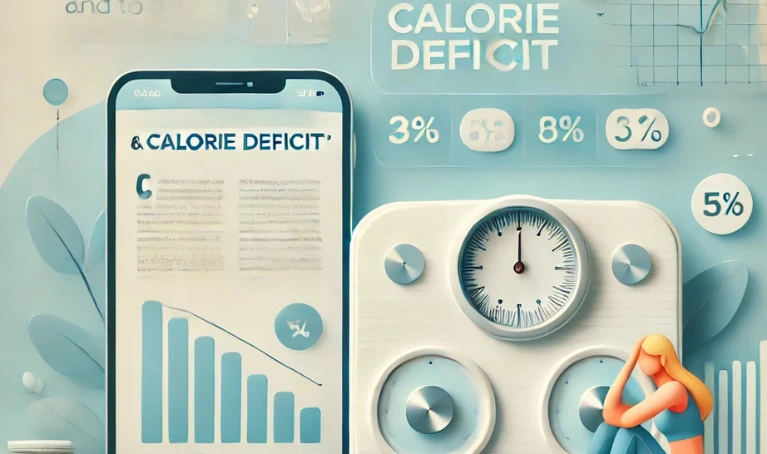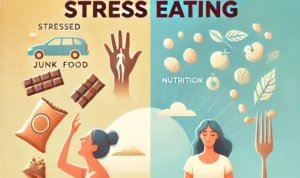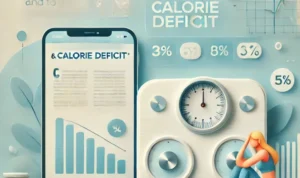Table of Contents
ToggleLosing weight can be frustrating, especially if you’re carefully tracking calories and sticking to a caloric deficit but seeing little to no progress on the scale. For many, the issue may not be the calorie deficit itself, but rather other factors that influence weight management, such as lifestyle habits, activity levels, and potential health conditions. In this guide, we’ll explain how calorie deficits work, discuss how long it typically takes to see results, and explore common reasons why you are not losing weight on calorie deficit?
How Does a Calorie Deficit Work?
What Is a Calorie Deficit?
A calorie deficit occurs when you consume fewer calories than your body requires to maintain its current weight. By forcing the body to rely on stored energy in the form of fat for fuel, a calorie deficit can gradually lead to weight loss over time. The principle is simple: burn more calories than you consume, and you should see a reduction in weight as your body starts to tap into fat stores for energy.
Creating a Calorie Deficit Safely
To ensure a safe and effective calorie deficit, aim to reduce your daily calorie intake by 500-1000 calories, depending on your starting weight and activity level. This range can help you lose about 1-2 pounds per week, which is a sustainable rate that minimizes risks such as nutrient deficiencies and muscle loss. Avoid extreme calorie restriction, as this can lead to unhealthy outcomes, including muscle loss, fatigue, and metabolic slowdown.
Helpful for you: Calories Calculator
How Long Does It Take to See Results in a Caloric Deficit?
Results from a calorie deficit can vary widely from person to person due to unique metabolic rates, body composition, and lifestyle factors. Generally, it may take anywhere from 1-2 weeks to see initial weight loss, but this timeline can depend on individual factors like starting weight, genetics, and daily activity levels. Understanding these timeframes can help set realistic expectations for sustainable progress.
- First Week: You may notice some initial changes, but this is usually due to water weight. Early weight loss is often temporary as the body adjusts to the calorie reduction.
- 2-4 Weeks: At this stage, real fat loss becomes more visible, and you may begin to see slight weight drops or changes in how your clothes fit.
- Beyond 4 Weeks: With a consistent deficit and healthy habits, you should experience steady fat loss as long as the calorie deficit is maintained, though this can vary based on your body’s response.
Top 10 Reasons You’re Not Losing Weight on Calorie Deficit
1. Inaccurate Calorie Tracking
Even small inaccuracies in tracking calories can add up quickly, potentially eliminating the calorie deficit you’re aiming for. Overeating by just a little each day can prevent weight loss without you realizing it, so it’s crucial to be precise with measurements and portion sizes.
2. Inconsistent Deficit Days
Occasional deviations from your calorie target, such as indulging on weekends or during social gatherings, can offset weekly progress. A few higher-calorie days can undo the entire deficit if not managed carefully. Consistency is essential to see reliable, long-term weight loss results.
3. Overeating Healthy Foods
Foods labeled as “healthy” or “low-calorie” can still be calorie-dense if consumed in excess. Items like nuts, oils, avocados, and even some protein bars can hinder weight loss progress, so keeping an eye on portion sizes is important for staying within the deficit.
4. Not Enough Physical Activity
Achieving a calorie deficit may be more challenging without regular physical activity, which plays a significant role in boosting calorie burn. Exercise not only helps with maintaining a deficit but also promotes muscle retention, which is essential for a healthy metabolism.
5. Loss of Muscle Mass
Extremely low-calorie diets can lead to muscle loss, which can hinder your weight loss journey. Muscle tissue is metabolically active, so losing it can slow your metabolism, making it harder to burn calories and achieve sustainable weight loss. Incorporating strength training can help mitigate this risk.
6. Body Adaptation (Metabolic Slowdown)
When in a prolonged calorie deficit, the body may adapt by slowing down metabolism, a process known as adaptive thermogenesis. This is a natural response designed to conserve energy, making it more difficult to maintain a deficit and requiring adjustments to calorie intake or activity level.
Must Read: How to Slow Metabolism for Fitness
7. Lack of Quality Sleep
Poor sleep quality affects weight loss efforts by disrupting hormones that regulate hunger and metabolism, such as ghrelin and leptin. Consistently sleeping less than seven hours per night can hinder your ability to lose weight, even with a calorie deficit in place.
8. Stress and Elevated Cortisol Levels
Chronic stress increases cortisol, a hormone that can lead to fat storage, particularly in the abdominal area. High stress can also cause cravings for high-calorie foods, which may make it harder to lose weight even if you’re maintaining a calorie deficit.
9. Medical Conditions or Medications
Certain medical conditions, such as hypothyroidism, polycystic ovary syndrome (PCOS), and insulin resistance, can make weight loss challenging. Additionally, some medications, including specific antidepressants and corticosteroids, can cause weight gain or prevent weight loss, even with a calorie deficit.
Also Read: 1200 calories diet Plan
10. Water Retention and Inflammation
Water retention, often due to high salt intake or inflammation from certain foods, can mask fat loss on the scale. Inflammatory foods and high-sodium diets can cause the body to hold onto extra water, leading to temporary weight gain, which can be frustrating during a weight loss journey.
Conclusion
A calorie deficit alone isn’t always enough to guarantee weight loss. Other influential factors, including tracking accuracy, sleep quality, stress levels, and potential underlying medical conditions, can significantly impact your progress and make it difficult to achieve desired results. Understanding and addressing these obstacles can help you break through plateaus and attain your weight goals more effectively and sustainably. If you’re not seeing progress, consider re-evaluating your habits and possibly seeking guidance from a healthcare professional.
Frequently Asked Questions
Why am I not losing weight on 1500 calories a day?
If you’re not losing weight on 1500 calories a day, it’s possible that you’re miscounting your intake, overestimating your activity level, or experiencing metabolic slowdown. Additionally, factors like low metabolism, muscle loss, or medical conditions could be affecting your weight loss progress despite a calorie deficit.
Why am I not losing weight on a 1200 calorie diet?
A 1200-calorie diet might be too restrictive, causing your body to enter a state of metabolic slowdown. Extreme calorie restriction can also lead to muscle loss and reduced energy, making it more challenging to lose weight sustainably over time. Consider adjusting your intake and incorporating strength training for better results.
Is it possible to be in a calorie deficit and not lose weight?
Yes, various factors like water retention, hormonal imbalances, and metabolism changes can prevent weight loss even when in a calorie deficit. Accurate tracking, along with lifestyle adjustments, may be necessary to see progress. Addressing these obstacles can help break through plateaus.
Why am I not losing weight despite a calorie deficit?
Inconsistencies in tracking, metabolic adaptation, high-stress levels, and sleep problems are common reasons people don’t lose weight despite a calorie deficit. To overcome this, reassess your approach and consider seeking advice from a professional to identify underlying issues that may be affecting your progress.





